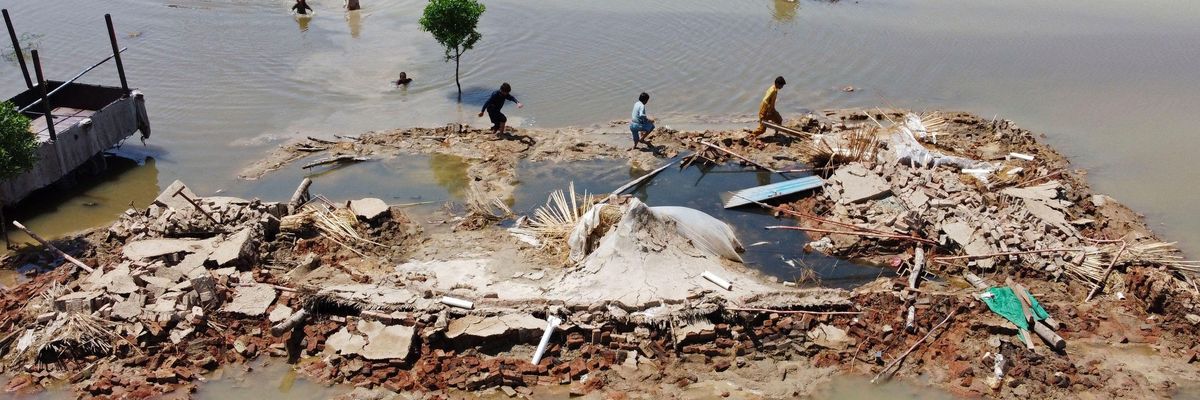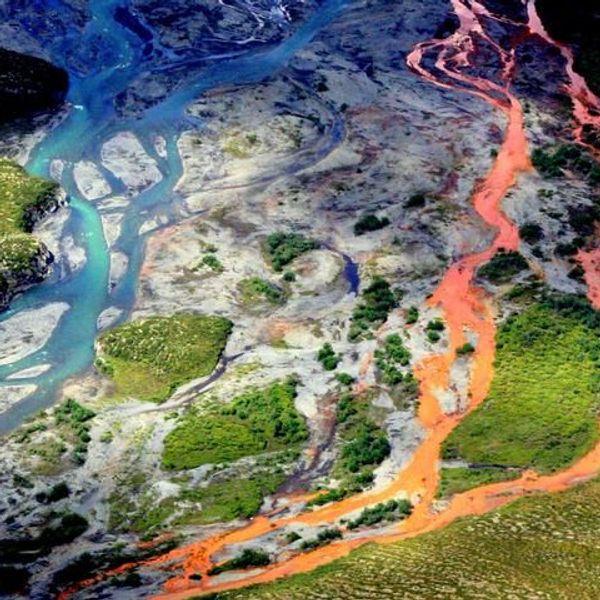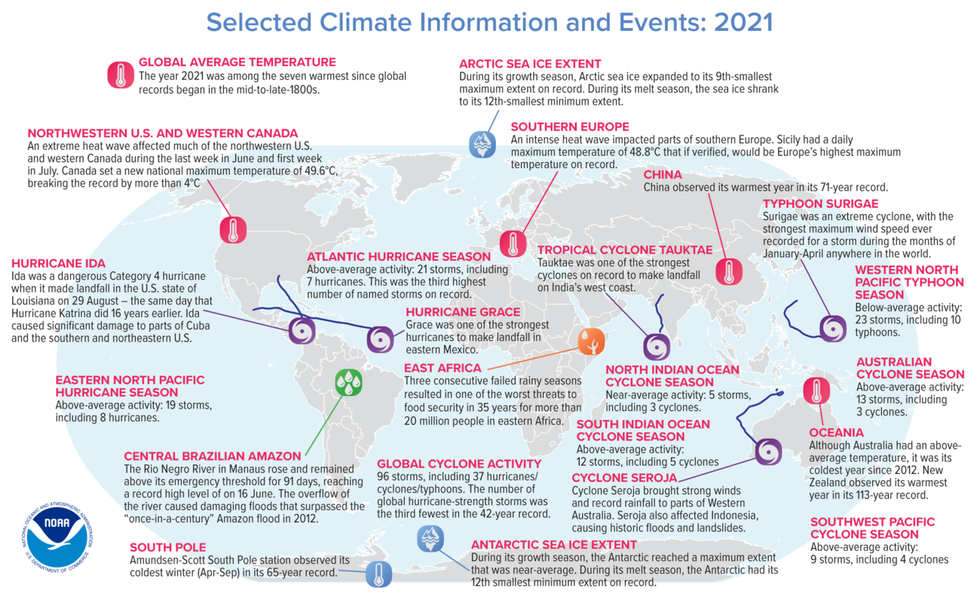
This aerial photograph taken in Pakistan's Balochistan province on August 31, 2022 shows people wading in floodwaters next to a house that collapsed due to monsoon rains turbocharged by the climate crisis. (Photo: Fida Hussain/AFP via Getty Images)
Greenhouse Gases, Sea Levels, and Ocean Heat All Hit New Highs in 2021: NOAA
"With many communities hit with 1,000-year floods, exceptional drought, and historic heat this year, it shows that the climate crisis is not a future threat but something we must address today."
Atmospheric greenhouse gas concentrations, global average sea levels, and ocean heat content surpassed previous records in 2021, underscoring the extent to which the fossil fuel-driven climate emergency is worsening in the absence of meaningful efforts to fundamentally reorganize the world's political economy.
" Climate change has global impacts and shows no sign of slowing."
That's according to the 32nd annual State of the Climate report--an international assessment involving more than 530 scientists from 67 countries--compiled by the U.S. National Oceanic and Atmospheric Administration's (NOAA) National Centers for Environmental Information and published on Wednesday.
Key findings from the report, as summarized by NOAA, include:
- Earth's greenhouse gases were the highest on record. The major atmospheric greenhouse gas concentrations--carbon dioxide, methane, and nitrous oxide--each rose once again to new record highs during 2021. The global annual average atmospheric carbon dioxide concentration was 414.7 parts per million (ppm). This was 2.3 ppm greater than 2020 amounts and was the highest measured in the modern observational records as well as the highest in at least the last million years based on paleoclimatic records. The annual average atmospheric methane concentration was also the highest on record, and the annual increase of 18 parts per billion (ppb) was the highest since measurements began. The annual increase in methane has significantly accelerated since 2014. The annual increase of 1.3 ppb for nitrous oxide was the third highest since 2001, contributing to a global annual average atmospheric concentration of 334.3 ppb.
- Earth's warming trend continued. A range of scientific analyses indicate that annual global surface temperatures were 0.38-0.50oF (0.21-0.28oC) above the 1991-2020 average. This places 2021 among the six warmest years since records began in the mid- to late-1800s. The last seven years (2015-2021) were the seven warmest years on record, and the average global surface temperature has increased at an average rate of 0.14-0.16oF (0.08 - 0.09oC) per decade since the start of record-keeping and at a rate more than twice as high since 1981 (0.32-0.36oF, or 0.18-0.20oC, per decade since 1981, according to a range of scientific analyses).
- Ocean heat and global sea level were the highest on record. The ocean sequesters the vast majority of the excess energy trapped in the Earth's system by greenhouse gases and other factors; estimated at more than 90% over the past half-century. Global ocean heat content, measured from the ocean's surface to a depth of more than 6,000 feet, continued to increase and reached new record highs in 2021. For the 10th consecutive year, global average sea level rose to a new record high and was about 3.8 inches (97.0 mm) higher than the 1993 average--the year that marks the beginning of the satellite measurement record.
"The data presented in this report are clear--we continue to see more compelling scientific evidence that climate change has global impacts and shows no sign of slowing," NOAA Administrator Rick Spinrad said in a statement.
The report includes a map depicting just some "notable climate anomalies and events in 2021."
"There were 97 named tropical storms during the Northern and Southern Hemisphere storm seasons last year, well above the 1991-2020 average of 87," NOAA noted. "The North Atlantic hurricane basin recorded 21 named storms, the third most for the basin, behind the record 30 cyclones in 2020 and 28 in 2005."
"Category 4 Hurricane Ida was the most impactful storm in the Atlantic," the agency added. "At $75 billion in damage, Ida was the costliest U.S. disaster of 2021 and the fifth most expensive hurricane on record since 1980. Super Typhoon Rai was the third-costliest typhoon in the history of the Philippines causing about $1 billion in damages and more than 400 deaths."
Given its focus on 2021, the report doesn't examine extreme weather disasters from this year. In the past month alone, however, large swaths of the world have been contending with record-shattering droughts, famine, heatwaves, and flooding.
In Pakistan, for instance, hundreds of people have died and millions have been displaced as entire communities are inundated due to weeks of monsoon rains turbocharged by planet-heating pollution.
Despite generating less than 1% of those emissions, Pakistanis have been forced to endure their worst consequences, with the World Health Organization warning of an impending spike in malaria, dengue fever, and other water and vector-borne diseases.
"With many communities hit with 1,000-year floods, exceptional drought, and historic heat this year," said Spinrad, "it shows that the climate crisis is not a future threat but something we must address today."
The latest State of the Climate report was published just two days after the International Energy Agency and the Organization for Economic Cooperation and Development reported that subsidies provided by 51 governments around the world to prop up the production and consumption of coal, oil, and gas nearly doubled to $700 billion in 2021 while the industry raked in massive profits.
"Fossil fuel subsidies are a roadblock to a more sustainable future, but the difficulty that governments face in removing them is underscored at times of high and volatile fuel prices," said IEA director Fatih Birol.
"A surge in investment in clean energy technologies and infrastructure is the only lasting solution to today's global energy crisis," he said, "and the best way to reduce the exposure of consumers to high fuel costs."
An Urgent Message From Our Co-Founder
Dear Common Dreams reader, The U.S. is on a fast track to authoritarianism like nothing I've ever seen. Meanwhile, corporate news outlets are utterly capitulating to Trump, twisting their coverage to avoid drawing his ire while lining up to stuff cash in his pockets. That's why I believe that Common Dreams is doing the best and most consequential reporting that we've ever done. Our small but mighty team is a progressive reporting powerhouse, covering the news every day that the corporate media never will. Our mission has always been simple: To inform. To inspire. And to ignite change for the common good. Now here's the key piece that I want all our readers to understand: None of this would be possible without your financial support. That's not just some fundraising cliche. It's the absolute and literal truth. We don't accept corporate advertising and never will. We don't have a paywall because we don't think people should be blocked from critical news based on their ability to pay. Everything we do is funded by the donations of readers like you. Will you donate now to help power the nonprofit, independent reporting of Common Dreams? Thank you for being a vital member of our community. Together, we can keep independent journalism alive when it’s needed most. - Craig Brown, Co-founder |
Atmospheric greenhouse gas concentrations, global average sea levels, and ocean heat content surpassed previous records in 2021, underscoring the extent to which the fossil fuel-driven climate emergency is worsening in the absence of meaningful efforts to fundamentally reorganize the world's political economy.
" Climate change has global impacts and shows no sign of slowing."
That's according to the 32nd annual State of the Climate report--an international assessment involving more than 530 scientists from 67 countries--compiled by the U.S. National Oceanic and Atmospheric Administration's (NOAA) National Centers for Environmental Information and published on Wednesday.
Key findings from the report, as summarized by NOAA, include:
- Earth's greenhouse gases were the highest on record. The major atmospheric greenhouse gas concentrations--carbon dioxide, methane, and nitrous oxide--each rose once again to new record highs during 2021. The global annual average atmospheric carbon dioxide concentration was 414.7 parts per million (ppm). This was 2.3 ppm greater than 2020 amounts and was the highest measured in the modern observational records as well as the highest in at least the last million years based on paleoclimatic records. The annual average atmospheric methane concentration was also the highest on record, and the annual increase of 18 parts per billion (ppb) was the highest since measurements began. The annual increase in methane has significantly accelerated since 2014. The annual increase of 1.3 ppb for nitrous oxide was the third highest since 2001, contributing to a global annual average atmospheric concentration of 334.3 ppb.
- Earth's warming trend continued. A range of scientific analyses indicate that annual global surface temperatures were 0.38-0.50oF (0.21-0.28oC) above the 1991-2020 average. This places 2021 among the six warmest years since records began in the mid- to late-1800s. The last seven years (2015-2021) were the seven warmest years on record, and the average global surface temperature has increased at an average rate of 0.14-0.16oF (0.08 - 0.09oC) per decade since the start of record-keeping and at a rate more than twice as high since 1981 (0.32-0.36oF, or 0.18-0.20oC, per decade since 1981, according to a range of scientific analyses).
- Ocean heat and global sea level were the highest on record. The ocean sequesters the vast majority of the excess energy trapped in the Earth's system by greenhouse gases and other factors; estimated at more than 90% over the past half-century. Global ocean heat content, measured from the ocean's surface to a depth of more than 6,000 feet, continued to increase and reached new record highs in 2021. For the 10th consecutive year, global average sea level rose to a new record high and was about 3.8 inches (97.0 mm) higher than the 1993 average--the year that marks the beginning of the satellite measurement record.
"The data presented in this report are clear--we continue to see more compelling scientific evidence that climate change has global impacts and shows no sign of slowing," NOAA Administrator Rick Spinrad said in a statement.
The report includes a map depicting just some "notable climate anomalies and events in 2021."
"There were 97 named tropical storms during the Northern and Southern Hemisphere storm seasons last year, well above the 1991-2020 average of 87," NOAA noted. "The North Atlantic hurricane basin recorded 21 named storms, the third most for the basin, behind the record 30 cyclones in 2020 and 28 in 2005."
"Category 4 Hurricane Ida was the most impactful storm in the Atlantic," the agency added. "At $75 billion in damage, Ida was the costliest U.S. disaster of 2021 and the fifth most expensive hurricane on record since 1980. Super Typhoon Rai was the third-costliest typhoon in the history of the Philippines causing about $1 billion in damages and more than 400 deaths."
Given its focus on 2021, the report doesn't examine extreme weather disasters from this year. In the past month alone, however, large swaths of the world have been contending with record-shattering droughts, famine, heatwaves, and flooding.
In Pakistan, for instance, hundreds of people have died and millions have been displaced as entire communities are inundated due to weeks of monsoon rains turbocharged by planet-heating pollution.
Despite generating less than 1% of those emissions, Pakistanis have been forced to endure their worst consequences, with the World Health Organization warning of an impending spike in malaria, dengue fever, and other water and vector-borne diseases.
"With many communities hit with 1,000-year floods, exceptional drought, and historic heat this year," said Spinrad, "it shows that the climate crisis is not a future threat but something we must address today."
The latest State of the Climate report was published just two days after the International Energy Agency and the Organization for Economic Cooperation and Development reported that subsidies provided by 51 governments around the world to prop up the production and consumption of coal, oil, and gas nearly doubled to $700 billion in 2021 while the industry raked in massive profits.
"Fossil fuel subsidies are a roadblock to a more sustainable future, but the difficulty that governments face in removing them is underscored at times of high and volatile fuel prices," said IEA director Fatih Birol.
"A surge in investment in clean energy technologies and infrastructure is the only lasting solution to today's global energy crisis," he said, "and the best way to reduce the exposure of consumers to high fuel costs."
Atmospheric greenhouse gas concentrations, global average sea levels, and ocean heat content surpassed previous records in 2021, underscoring the extent to which the fossil fuel-driven climate emergency is worsening in the absence of meaningful efforts to fundamentally reorganize the world's political economy.
" Climate change has global impacts and shows no sign of slowing."
That's according to the 32nd annual State of the Climate report--an international assessment involving more than 530 scientists from 67 countries--compiled by the U.S. National Oceanic and Atmospheric Administration's (NOAA) National Centers for Environmental Information and published on Wednesday.
Key findings from the report, as summarized by NOAA, include:
- Earth's greenhouse gases were the highest on record. The major atmospheric greenhouse gas concentrations--carbon dioxide, methane, and nitrous oxide--each rose once again to new record highs during 2021. The global annual average atmospheric carbon dioxide concentration was 414.7 parts per million (ppm). This was 2.3 ppm greater than 2020 amounts and was the highest measured in the modern observational records as well as the highest in at least the last million years based on paleoclimatic records. The annual average atmospheric methane concentration was also the highest on record, and the annual increase of 18 parts per billion (ppb) was the highest since measurements began. The annual increase in methane has significantly accelerated since 2014. The annual increase of 1.3 ppb for nitrous oxide was the third highest since 2001, contributing to a global annual average atmospheric concentration of 334.3 ppb.
- Earth's warming trend continued. A range of scientific analyses indicate that annual global surface temperatures were 0.38-0.50oF (0.21-0.28oC) above the 1991-2020 average. This places 2021 among the six warmest years since records began in the mid- to late-1800s. The last seven years (2015-2021) were the seven warmest years on record, and the average global surface temperature has increased at an average rate of 0.14-0.16oF (0.08 - 0.09oC) per decade since the start of record-keeping and at a rate more than twice as high since 1981 (0.32-0.36oF, or 0.18-0.20oC, per decade since 1981, according to a range of scientific analyses).
- Ocean heat and global sea level were the highest on record. The ocean sequesters the vast majority of the excess energy trapped in the Earth's system by greenhouse gases and other factors; estimated at more than 90% over the past half-century. Global ocean heat content, measured from the ocean's surface to a depth of more than 6,000 feet, continued to increase and reached new record highs in 2021. For the 10th consecutive year, global average sea level rose to a new record high and was about 3.8 inches (97.0 mm) higher than the 1993 average--the year that marks the beginning of the satellite measurement record.
"The data presented in this report are clear--we continue to see more compelling scientific evidence that climate change has global impacts and shows no sign of slowing," NOAA Administrator Rick Spinrad said in a statement.
The report includes a map depicting just some "notable climate anomalies and events in 2021."
"There were 97 named tropical storms during the Northern and Southern Hemisphere storm seasons last year, well above the 1991-2020 average of 87," NOAA noted. "The North Atlantic hurricane basin recorded 21 named storms, the third most for the basin, behind the record 30 cyclones in 2020 and 28 in 2005."
"Category 4 Hurricane Ida was the most impactful storm in the Atlantic," the agency added. "At $75 billion in damage, Ida was the costliest U.S. disaster of 2021 and the fifth most expensive hurricane on record since 1980. Super Typhoon Rai was the third-costliest typhoon in the history of the Philippines causing about $1 billion in damages and more than 400 deaths."
Given its focus on 2021, the report doesn't examine extreme weather disasters from this year. In the past month alone, however, large swaths of the world have been contending with record-shattering droughts, famine, heatwaves, and flooding.
In Pakistan, for instance, hundreds of people have died and millions have been displaced as entire communities are inundated due to weeks of monsoon rains turbocharged by planet-heating pollution.
Despite generating less than 1% of those emissions, Pakistanis have been forced to endure their worst consequences, with the World Health Organization warning of an impending spike in malaria, dengue fever, and other water and vector-borne diseases.
"With many communities hit with 1,000-year floods, exceptional drought, and historic heat this year," said Spinrad, "it shows that the climate crisis is not a future threat but something we must address today."
The latest State of the Climate report was published just two days after the International Energy Agency and the Organization for Economic Cooperation and Development reported that subsidies provided by 51 governments around the world to prop up the production and consumption of coal, oil, and gas nearly doubled to $700 billion in 2021 while the industry raked in massive profits.
"Fossil fuel subsidies are a roadblock to a more sustainable future, but the difficulty that governments face in removing them is underscored at times of high and volatile fuel prices," said IEA director Fatih Birol.
"A surge in investment in clean energy technologies and infrastructure is the only lasting solution to today's global energy crisis," he said, "and the best way to reduce the exposure of consumers to high fuel costs."


